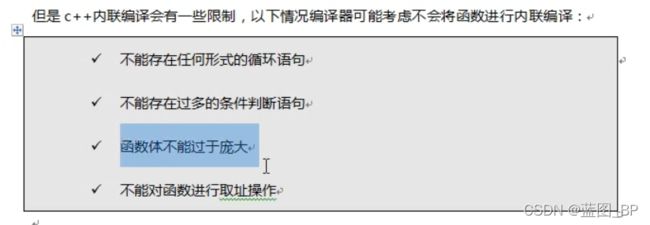黑马c++核心编程复习_Day2
目录
内联函数
函数默认参数和占位参数
函数重载的基本语法及注意事项
extern C浅析
c和c++语言的封装
内联函数
- 内联函数
- 内联函数引出---宏缺陷
- 宏缺陷:
- 必须要加括号保证运算完整
- 即使加括号,有些运算依然与预期结果不符
- 普通函数不会出现缺陷
- 宏缺陷:
- C++提供 内联函数代替宏函数
- 关键字 inline
- 在函数声明和实现中同时加入关键字 inline 才称为内联
- 在成员函数前 都隐式加了关键字inline
- 有些特殊情况下 ,写了关键字inline也不会按照内联方式处理
- 出现循环
- 出现判断
- 函数体过于庞大
- 对函数进行取地址
- 总结: 内联函数只是给编译器一个建议,但是编译器不一定接受这个建议,好的编译器会自己给短小的函数前加上关键字inline
- 内联函数引出---宏缺陷
#define _CRT_SECURE_NO_WARNINGS
#include
using namespace std;
//宏缺陷1 : 必须要加括号保证运算完整
#define MYADD(x,y) ((x) +(y))
void test01()
{
int a = 10;
int b = 20;
int ret = MYADD(a, b) * 20;
cout << ret << endl;
}
//宏缺陷2: 即使加了括号,有些运算依然与预期不符
#define MYCOMPARE(a,b) (((a) < (b)) ? (a) : (b))
//普通函数 不会出现与预期结果不符的问题
void myCompare(int a, int b)
{
int ret = a < b ? a : b;
cout << "ret = " << ret << endl;
}
void test02()
{
int a = 10;
int b = 20;
myCompare(++a, b);
//int ret = MYCOMPARE(++a, b); //预期是 11 结果变为12 (((++a) < (b)) ? (++a) : (b))
//cout << "ret = " << ret << endl;
}
//内联函数
//函数的声明和实现必须同时加关键字 inline 才算内联函数
//内联函数 好处 :解决宏缺陷,本身是一个函数,带来宏优势,以空间换时间,在适当的时候做展开
inline void func();
inline void func(){};
//类内部的成员函数 在函数前都隐式加了关键字 inline
int main(){
//test01();
test02();
system("pause");
return EXIT_SUCCESS;
} 函数默认参数和占位参数
-
- 默认参数
- 可以给函数的形参添加默认值
- 语法 形参 类型 变量 = 默认值
- int func(int a, int b = 10 , int c = 10)
- 注意事项 ,如果有一个位置有了默认参数,那么从这个位置起,从左到右都必须有默认值
- 函数的声明和实现 只能有一个 提供默认参数,不可以同时加默认参数
- 占位参数
- 只写一个类型进行占位,调用时候必须要传入占位值
- void func2(int a , int = 1)
- 占位参数也可以有默认值
- 默认参数
#define _CRT_SECURE_NO_WARNINGS
#include
using namespace std;
//默认参数 语法 形参 类型 变量 = 默认值
//注意事项 ,如果有一个位置有了默认参数,那么从这个位置起,从左到右都必须有默认值
int func(int a, int b = 10 , int c = 10)
{
return a + b + c;
}
void test01()
{
cout << func(20 , 10) << endl;
}
//函数的声明和实现 只能有一个 提供默认参数,不可以同时加默认参数
void myFunc(int a = 10, int b = 10);
void myFunc(int a , int b){};
//占位参数 只写一个类型进行占位,调用时候必须要传入占位值
//占位参数 用途? 目前没用
void func2(int a , int = 1)
{
}
void test02()
{
func2(10);
}
int main(){
test01();
system("pause");
return EXIT_SUCCESS;
} 函数重载的基本语法及注意事项
- 函数重载
- 满足条件
- 同一个作用域下
- 函数名称相同
- 函数参数个数、类型、顺序不同
- 函数的返回值 不可以作为重载条件
- 注意事项
- 加const和不加const的引用可以作为重载条件
- 函数重载碰到默认参数 注意避免二义性出现
- 满足条件
#define _CRT_SECURE_NO_WARNINGS
#include
using namespace std;
//函数重载条件
//1、在同一个作用域
//2、函数名称相同
//3、参数个数、类型、顺序不同
//class Person
//{
//public:
// void func() 成员函数 而不是全局函数
// {
// }
//};
void func()
{
cout << "func()调用" << endl;
}
void func(int a)
{
cout << "func(int a)调用" << endl;
}
void func(double a)
{
cout << "func(double a)调用" << endl;
}
void func(int a, double b)
{
cout << "func(int a ,double b)调用" << endl;
}
void func(double a, int b)
{
cout << "func(double a, int b)调用" << endl;
}
//返回值可不可以作为函数重载的条件 答案:不可以
//int func(int a, double b)
//{
// cout << "func(int a ,double b)调用" << endl;
//}
void test01()
{
func(1,3.14);
}
//函数重载中 引用两个版本
//void myFunc(int a)
//{
// cout << "myfunc(int a )调用" << endl;
//}
void myFunc(int &a) // int & a = 10;
{
cout << "myfunc(int &a )调用" << endl;
}
void myFunc(const int &a) // const int &a = 10;
{
cout << "myfunc( const int &a )调用" << endl;
}
void test02()
{
int a = 10;
//myFunc(a);//需要避免二义性出现
}
//函数重载碰到默认参数 注意避免二义性出现
void func2(int a , int b = 10)
{
}
void func2(int a)
{
}
void test03()
{
//func2(10); //出现二义性
}
int main(){
//test01();
test02();
system("pause");
return EXIT_SUCCESS;
} extern C浅析
- extern C 浅析
- 用途:在C++中调用C语言文件
- C++中有函数重载,会对函数名称做修饰,导致调用C语言的函数链接失败
- 利用extern C可以解决问题
- 方法1:
- 在C++代码中加入
- 告诉编译器 show函数用C语言方式 做链接
- //extern "C" void show();
- 方法2:
- 在C语言的头文件中加入6行代码
- #ifdef __cplusplus // 两个下划线 __ c plus plus
- extern "C" {
- #endif
- #ifdef __cplusplus // 两个下划线 __ c plus plus
- }
- #endif
- 方法1:
c和c++语言的封装
- 封装
- C语言的封装
- 缺陷 将属性和行为分离
- C++语言的封装
- 将属性和行为作为一个整体,来表现生活中的事物
- 将属性和行为 加以权限控制
- 访问权限
- 公共权限 public 类内 类外 都可以访问
- 私有权限 private 类内可以访问 类外不可以访问
- 保护权限 protected类内可以访问 类外不可以访问
- class 默认权限 私有权限 而 struct默认权限是 公共权限
- C语言的封装
